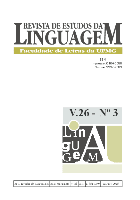
Revista de Estudos da Linguagem
Scope & Guideline
Bridging Gaps in Language Studies Since 1992
Introduction
Aims and Scopes
- Interdisciplinary Linguistic Research:
The journal emphasizes research that crosses traditional boundaries in linguistics, integrating insights from sociolinguistics, psycholinguistics, and applied linguistics to explore complex language phenomena. - Language Variation and Change:
A core focus is on the dynamics of language variation and change, investigating how sociolinguistic factors influence language use across different communities and contexts. - Language Acquisition and Education:
The journal publishes studies related to language acquisition processes, particularly in educational settings, addressing challenges and methodologies for teaching languages effectively. - Pragmatics and Discourse Analysis:
Research on pragmatics and discourse is significant, exploring how language functions in context and how meaning is constructed through interaction. - Corpus Linguistics and Empirical Studies:
The use of corpus linguistics as a methodological approach is prevalent, with studies utilizing large datasets to analyze linguistic phenomena and validate theoretical claims. - Cultural and Political Dimensions of Language:
The journal also addresses the intersection of language with cultural and political issues, including discourse analysis of political rhetoric and social movements.
Trending and Emerging
- Sociolinguistic Variation and Identity:
There is an increasing focus on how sociolinguistic variation interacts with identity formation, particularly in multilingual contexts and among marginalized communities. - Digital Discourse and Social Media:
Research exploring language use in digital environments, including social media discourse and its implications for public communication, is on the rise, reflecting the growing importance of online interactions. - Language and Power Dynamics:
Studies investigating the relationship between language and power, particularly in political discourse and social movements, are becoming more prominent, underscoring the role of language in societal change. - Multimodality in Communication:
Emerging interest in multimodal approaches to language, examining how various modes (text, visuals, gestures) interact in communication, is increasingly evident in recent publications. - Cognitive Linguistics and Language Processing:
The journal is seeing a rise in research that intersects cognitive linguistics and psycholinguistics, particularly studies that investigate language processing and its cognitive implications.
Declining or Waning
- Traditional Syntax Studies:
There has been a decline in papers solely focused on traditional syntax, as the field increasingly favors approaches that incorporate sociolinguistic and functional perspectives. - Historical Linguistics:
Research in historical linguistics appears to be waning, with fewer studies exploring diachronic changes in language forms and structures compared to previous years. - Phonetic Analysis without Contextual Frameworks:
Papers that focus exclusively on phonetics without considering sociolinguistic or pragmatic contexts are becoming less common, indicating a shift towards more integrative approaches. - Theoretical Linguistics:
There is a noticeable reduction in purely theoretical linguistics discussions, as the journal's focus shifts towards more applied research that addresses real-world language use. - Language and Technology Studies:
Research specifically addressing language technologies, such as computational linguistics, has seen a decline, possibly due to the saturation of this niche in recent years.
Similar Journals

RLA-Revista de Linguistica Teorica y Aplicada
Bridging the gap between linguistics theory and practical application.RLA-Revista de Linguística Teórica y Aplicada, published by Universidad de Concepción, Facultad de Humanidades y Arte, stands as a vital resource in the field of linguistics, delivering cutting-edge research and scholarly articles that contribute to both theoretical and applied linguistics. With its ISSN 0718-4883, this journal aims to foster robust discussions and innovations in linguistic theory, language acquisition, sociolinguistics, and applied linguistics methodologies. Although the journal currently does not provide open access options, it endeavors to reach a diverse audience, including researchers, professionals, and students, who are keen to explore the rich tapestry of language studies. By offering insights from both local and global perspectives, RLA does not only advance linguistic discourse but also encourages interdisciplinary collaboration, thereby solidifying its role as a pivotal publication in the linguistic academic community.
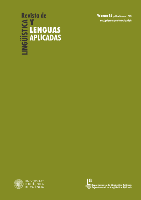
Revista de Linguistica y Lenguas Aplicadas
Shaping the Future of Language ScholarshipRevista de Linguistica y Lenguas Aplicadas, an esteemed journal published by UNIV POLITECNICA VALENCIA, EDITORIAL UPV, is a pivotal resource in the field of linguistics and applied languages. Since its inception, the journal has embraced Open Access publishing since 2006, ensuring that its rich repository of research is readily available to a global audience of researchers, academics, and language professionals. Headquartered in Valencia, Spain, the journal contributes significantly to the advancement of linguistics knowledge, boasting a respectable ranking within the Q3 quartile for Linguistics and Language (2023) according to Scopus metrics. It covers a diverse range of topics and methodologies, engaging readers through its commitment to scholarly rigor and innovation. The journal is uniquely positioned to inform and inspire essential discussions from 2015 to 2024, making it a vital platform for emerging linguists and seasoned scholars alike, as they explore the evolving landscapes of language and communication.

RUSSIAN LINGUISTICS
Empowering researchers in the study of Russian linguistics.RUSSIAN LINGUISTICS is a peer-reviewed academic journal published by Springer, dedicated to advancing the understanding of the Russian language and its interplay with various linguistic frameworks. With a longstanding history that spans from its inception in 1974, the journal encompasses a broad range of topics within the fields of linguistics and language studies, offering valuable insights especially in *Developmental and Educational Psychology* and the intricacies of linguistics at large. Currently ranked in the Q2 quartile for Linguistics and Language, and holding substantial positions within Scopus rankings, RUSSIAN LINGUISTICS serves as an essential resource for researchers, educators, and students alike, fostering dialogue and collaboration within the international linguistic community. The journal notably provides critical access to research findings that enhance the comprehension of Russian linguistics' role in a global context, despite operating under a traditional access model. For those pursuing scholarly excellence, RUSSIAN LINGUISTICS remains a pivotal platform for disseminating innovative research and promoting the study of language.

Concentric-Studies in Linguistics
Connecting scholars through groundbreaking linguistic studies.Concentric-Studies in Linguistics is a distinguished journal published by the National Taiwan Normal University, College of International Studies & Social Sciences. With an ISSN of 1810-7478 and an E-ISSN of 2589-5230, this journal contributes significantly to the field of linguistics, encompassing a wide range of topics from language acquisition to sociolinguistics. As of 2023, it holds a respectable Q3 ranking in both the Linguistics and Language categories, and it is positioned in the 28th and 24th percentiles within its Scopus ranks for the Arts and Humanities and Social Sciences, respectively. Although it operates under a traditional access model, its publication from 2014 to 2024 reflects a commitment to advancing academic discourse. Researchers, professionals, and students are encouraged to engage with its rich content as it provides a platform for innovative studies and critical analyses that push the boundaries of linguistic research.
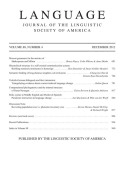
LANGUAGE
Fostering Innovation in Linguistic ResearchLANGUAGE, published by the Linguistic Society of America, is a premier academic journal dedicated to the rigorous study of linguistic theory and practice. With an ISSN of 0097-8507 and E-ISSN 1535-0665, this esteemed journal has established itself as a leading publication in the field of linguistics since its inception. The journal has consistently maintained a high impact factor, being ranked in the Q1 category in Linguistics and Language for 2023, placing it among the top tier of academic journals. Notably, it also holds impressive Scopus rankings, being positioned at #75 out of 1088 in Arts and Humanities, and #89 out of 1167 in Social Sciences, demonstrating a significant impact and reach in the discipline. While it is not an open-access journal, LANGUAGE provides crucial insights into linguistic research, fostering a vibrant academic community. Spanning years from 1996 to 2024, it continues to be an essential resource for researchers, professionals, and students alike, aiming to advance the understanding of language in its myriad forms and functions.

Forma y Funcion
Fostering dialogue and discovery in language studies.Forma y Funcion is a distinguished open access journal published by UNIV NACIONAL COLOMBIA, FAC CIENCIAS HUMANAS, dedicated to advancing the fields of linguistics and language studies. With an ISSN of 0120-338X and an E-ISSN of 2256-5469, the journal has been committed to open access since 2005, ensuring that research is freely accessible to scholars, professionals, and students around the globe. Situated in Bogotá, Colombia, it has established itself as a pivotal platform within the academic community, achieving a commendable Q2 ranking in 2023 in the subfield of Linguistics and Language. Its Scopus rankings further underscore its relevance, placing it in the 55th percentile among peers in the Arts and Humanities and the 51st percentile within Social Sciences. Covering a range of topics related to language and linguistics, Forma y Funcion aims to foster cutting-edge research and dialogue, making significant contributions to the field from 2019 through 2024 and beyond.

Language and Linguistics Compass
Charting New Territories in Language and LinguisticsLanguage and Linguistics Compass, published by Wiley, stands as a premier journal in the field of linguistics, showcasing innovative and interdisciplinary research. With its ISSN 1749-818X and E-ISSN matching, the journal has built a robust reputation, achieving an impressive Q1 ranking within the linguistics category for 2023, placing it in the top 4% of its field. Its Scopus rank of 48 out of 1167 highlights its influence and significance among linguistics journals, boasting a commendable 95th percentile. This journal serves as a vital resource for researchers, professionals, and students, offering a wide range of accessible articles that illuminate current trends and advances within the domain of language studies. Although it is not Open Access, the journal is committed to quality and diversity in its publications, ensuring scholarly articles from various sub-disciplines of linguistics are represented from 2008 through 2024. Located in the United Kingdom, Language and Linguistics Compass invites contributions from around the globe, reinforcing its status as a leading forum for linguistic discourse.
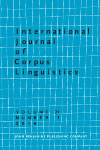
International Journal of Corpus Linguistics
Advancing the Science of Language through CorporaThe International Journal of Corpus Linguistics, published by John Benjamins Publishing Co, is a premier academic journal dedicated to advancing the field of corpus linguistics. With an ISSN of 1384-6655 and an E-ISSN of 1569-9811, this journal serves as a pivotal platform for researchers and practitioners alike to explore the intricate relationships between language and corpora. Housed in the Netherlands and operating within the prestigious Q1 category in Linguistics and Language, the journal boasts impressive Scopus rankings, positioning it in the top percentiles of both Arts and Humanities and Social Sciences. Its commitment to rigorous peer-reviewed scholarship not only enhances understanding in the domain but also fosters collaboration among scholars. With coverage spanning from 1996 to 2024, the journal publishes cutting-edge research that contributes valuable insights into linguistic patterns and empirical studies. Whether you're an established researcher or a student embarking on your academic journey, the International Journal of Corpus Linguistics is an essential resource for anyone seeking to deepen their understanding of language through corpora.

Glossa-A Journal of General Linguistics
Exploring the Frontiers of Linguistic KnowledgeGlossa: A Journal of General Linguistics, published by the Open Library of Humanities, stands as a leading voice in the realm of linguistic research since its inception in 2016. With its Q1 category ranking in Linguistics and Language and impressive Scopus ranks encompassing the top 83rd and 81st percentiles in its respective fields, Glossa fosters a vibrant academic community committed to the rigorous exploration of language and linguistic theory. Operating under an open access model, the journal not only enhances the visibility of groundbreaking research but also ensures that valuable insights are accessible to a global audience. The journal's commitment to interdisciplinary dialogue makes it an indispensable resource for scholars, professionals, and students eager to engage with contemporary developments in linguistics. As it converges into 2024, Glossa continues to champion innovative scholarship and critical discourse that challenges conventional boundaries within the field.
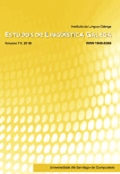
Estudos de Linguistica Galega
Fostering Collaboration in Galician Language StudiesEstudos de Linguistica Galega, an esteemed journal published by the University of Santiago de Compostela, provides a critical platform for scholars engaged in the vibrant field of linguistics, particularly focusing on the Galician language and its surrounding linguistic phenomena. Launched in 2009, this Open Access journal enables unrestricted dissemination of research, facilitating engagement from a global audience. With an impact factor that positions it within the Q4 quartile in Linguistics and Language, it reveals a strong commitment to advancing the discourse in this niche. It ranks #691 out of 1088 in the Arts and Humanities category, underscoring its relevance in the academic landscape. The journal aims to foster collaboration and innovation among researchers and practitioners, making significant contributions to understanding linguistic diversity and its implications in contemporary society. Located in Santiago de Compostela, Spain, the journal encourages submissions that explore theoretical, empirical, and applied linguistic studies, thereby inviting researchers, professionals, and students to contribute to this growing field.